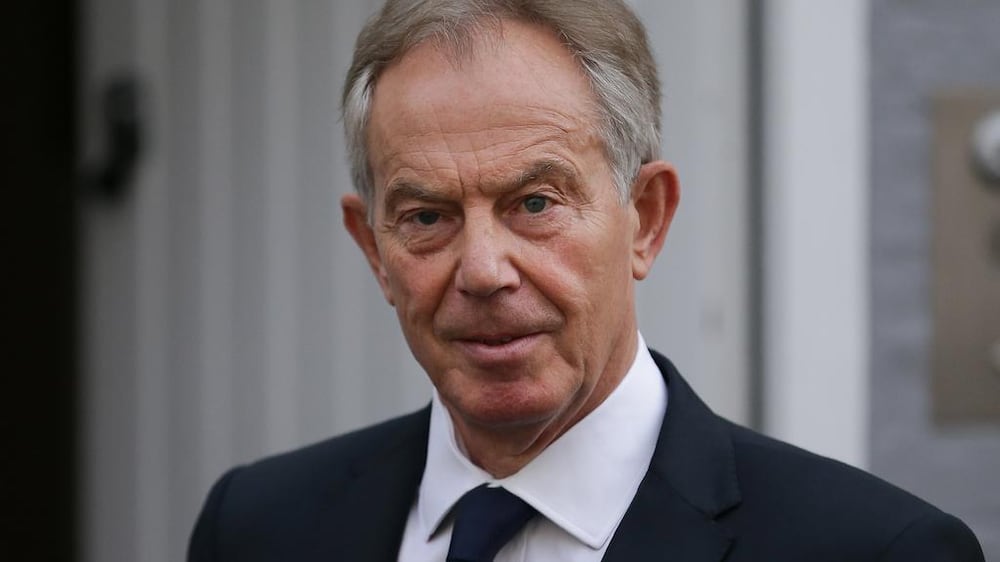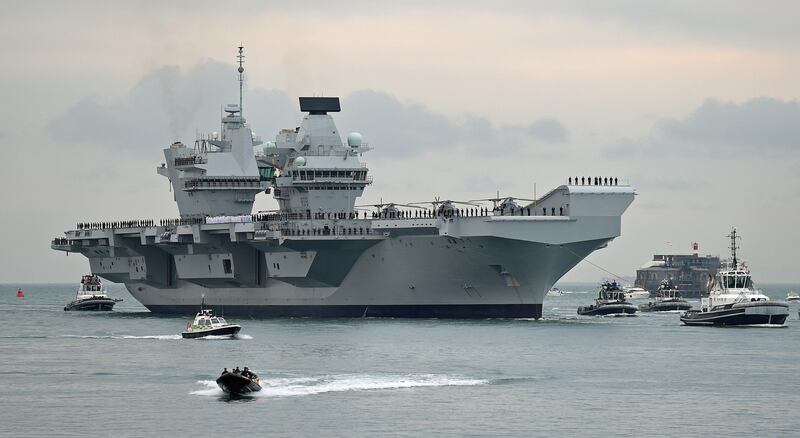The arrival of the first of Britain's new aircraft carriers at her home port of Portsmouth this summer signals a significant shift in how the country is likely to tackle future conflicts around the globe.
The construction of the two 65,000-tonne Queen Elizabeth-class carriers - the biggest warships ever built in the Royal Navy’s illustrious history - have been mired in controversy ever since former Labour prime minister Gordon Brown signed the contract for their construction a decade ago.
Critics have questioned the estimated £6 billion (Dh28.4 billion) cost of building the ships, as well as whether they are relevant to modern war-fighting at a time when many countries are looking at new technologies, such as cyber and robotics, to enhance their capabilities.
_______________
More from Con Coughlin
[ The UK government must fully assess the threat posed by the Muslim Brotherhood ]
_______________
But defenders of the programme - which could easily double in cost once the carriers are equipped with a full complement of state-of-the-art F-35 stealth jets - argue the ships will provide the British military with greater flexibility when it comes to tackling future security challenges, as well as providing enormous firepower.
Moreover, at a time when emerging powers like China and India are hard at work developing their own carrier strike capability – to quote the naval jargon – British military officials believe it is essential that Britain maintains its own fleet of carriers if it wants to maintain its status as one of the world’s leading military powers.
But if the political arguments over the worth of the new carriers is likely to continue for many years to come, the more significant issue is the impact the new carriers will have on Britain’s approach to future conflict when they become fully operational at the end of this decade.
After the September 11 attacks in 2001, Britain’s primary military response to the conflicts in Iraq and Afghanistan was to deploy large quantities of ground troops as part of a US-led coalition.
_______________
Read more on Afghanistan from Opinion
[ Afghanistan is the US's new Vietnam ]
[ Donald Trump's "path forward" in Afghanistan is a rebrand not a step ahead ]
_______________
In each case, the UK deployed and maintained a division-strength force for several years.
But politicians on both sides of the Atlantic soon came to view the presence of large numbers of western troops on foreign soil as counterproductive, particularly after the Bush administration’s inept handling of Iraq following the overthrow of dictator Saddam Hussein resulted in widespread sectarian bloodshed. It was a similar picture in southern Afghanistan, where the British Army’s sizeable military presence was deemed to have encouraged thousands of young Afghans to join the ranks of the Taliban.
Consequently, politicians of all persuasions in London now take the view that large-scale deployments of ground troops on the scale seen in Iraq and Afghanistan should be avoided at all costs. Instead, they now regard the ideal model for military intervention to be a combination of air power and special forces, which has dictated how Britain and its allies have responded to the more recent campaigns against Libyan dictator Col Muammar Gaddafi and ISIL in and Iraq.
Debating the legacy of Tony Blair

The arrival of the new carriers, therefore, will only reinforce the UK's approach to future conflicts, as these vast floating airfields provide the military with the ability to mount campaigns without the need of deploying significant numbers of ground troops.
A good example of how the military might of an aircraft carrier battle group can be used to good effect has been the role the US Navy's 97,000-tonne Nimitz-class carrier, the USS George HW Bush, has played in the bombing campaign against ISIL targets. Washington has also deployed its aircraft carriers to the Korean peninsula in an attempt to dissuade North Korean dictator Kim Jong-un from carrying out his threat to fire ballistic missiles at targets in the Pacific.
But before British politicians get too carried away with the idea of relying exclusively on the Royal Navy's new generation of aircraft carriers to take care of the country's security requirements, they should take note and not neglect other important areas of the armed forces, especially the army.
It might currently be the fashion not to resort to large-scale ground deployments, but that does not mean that one day there might not be a demand for Britain and its allies to do so.
The deteriorating security situation in Libya, for example, could easily require the deployment of western ground troops to stabilise the situation, particularly if ISIL-associated terrorist groups were found to be using the country as a base to launch terror attacks against Europe, as Al Qaeda used to do from Afghanistan.
_______________
Read more on Libya
[ Editorial: The long road to peace and reconciliation in Libya ]
[ UN envoy announces high-level meeting on Libya ]
_______________
There are concerns, though, that Britain currently would struggle to find sufficient numbers of troops for such an operation following the recent drastic cuts to the strength of the army, which has seen it reduced to its lowest level since the early 19th century. There are now fears that it will be cut further as Whitehall looks to find extra funds to finance the expensive carrier programme.
This could prove to be a costly mistake. Britain’s powerful new aircraft carriers will certainly help to maintain Britain’s status as a military power. But if they are to be financed at the expense of other important military assets like the army, then they could leave Britain and her allies exposed to threats that cannot be tackled solely by relying on carriers.
Con Coughlin is The Telegraph's defence and foreign affairs editor
Follow The National's Opinion section on Twitter





